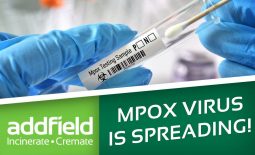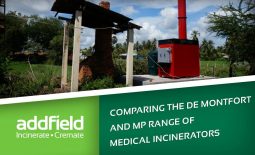
Returning to the Ivory Coast
Just two years after their initial project in the Ivory Coast (Cote d'Ivoire) was completed Addfield has once again been commissioned to deliver more essential solutions for medical waste disposal to laboratories and clinics across the county.
As part of a program of continuing investment in the environment across the Ivory Coast, overseen by National Food and Animal Health Laboratory (LANADA) on behalf of the Government and sponsored by the USAID and WFP international aid programs. This project has progressed across several stages for safely disposing of hazardous medical waste. The initial project was originally for one location it has since expanded to cover multiple locations across the region beginning with the historic city of Bingerville.
Beginning in 2018 when SOFIM SARL first contracted Addfield to deliver a solution. This first stage of the project was for the incorporation of two modern incinerators that would be capable of cleanly disposing of large quantities of hazardous waste created across their research and testing facilities.

These laboratories were creating a range of waste including animal and biomedical by-products as such they required two machines to treat this securely. Following extensive research, they selected the MP100 and the MP200, which met and exceeded the specifications required.
"Addfield is proud to grow its network in Ivory Coast; it's another case of delivering a complete package solution to respond to our customers needs anywhere in Africa; in addition to supply a state of art machine we go the extra mile to provide direct onsite support, whether it is training, multilanguage communication assistance, spares parts etc." Abraham Bah, Addfield Representative/Distributor for Africa.
The supply and installation of these Addfield incinerators were so well received that it made local news headlines. Originally installed in July 2018 after two years of continuous operation the customer has returned to Addfield satisfied in the performance of the machines, their reliability and the ongoing follow up support by Addfield technicians and representatives. The impact that these machines have had on the environment and local communities is immense and has been recognised. As a result of this, SOFIM SARL has once again selected Addfield to supply three more MP200 machines to update more health centres and laboratories across the country.

Before these machines were installed the waste had previously been disposed of by being burned openly in the backyard of the facility. An approach that resulted in many complaints from the local residents about the smoke and odours that were regularly being created. The impact of this air pollution had become a genuine cause for concern, potentially causing serious health problems for both the staff and the surrounding community.
Unfortunately, this is all too common a practice across many developing countries. Waste disposal has not been prioritised and as such open incineration is common for destroying medical waste. This is a far from ideal approach. When compared to controlled incineration, open fires run the very real risks of spreading diseases and hazards. From floating particles and pieces of debris potentially carrying bacteria beyond the grounds, to also releasing highly toxic chemicals into the atmosphere when burning plastics and other materials. In addition to the air pollution aspect, the volume of waste is not reduced greatly resulting in contagious waste still being disposed of at landfill or local dumps.
Although a controlled open fire can reach temperatures close to 900°C in places the temperatures can be considerably lower elsewhere, giving an uneven burn leaving some waste virtually untouched. An Addfield MP incinerator has multiple chambers which guarantees that all waste is safely destroyed and sterilised. The first chamber destroys the waste, burning it at temperatures up to 1000°C, and reducing it to safe sterile ash at only 3% of the initial volume, this is safe enough for landfill in most countries. After the primary chamber, the secondary chamber treats the waste gasses removing all odours, smoke and most importantly pathogens, furans and pollutants, firing at temperatures up to 1100°C along a 2 second retention time which ensures only clean gasses are returned back into the environment which is a massive improvement for the local community.




